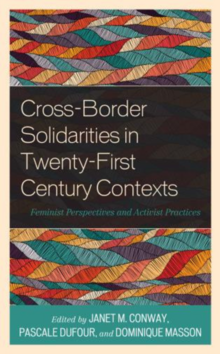This collection considers how political solidarities are being understood and constructed in a variety of cross-border struggles and for what ends under twenty-first century conditions. In studies grounded in different world regions at a variety of scales, authors address the following issues: how the Cold War divide and its aftermath have structured contemporary asymmetries in European LGBT movements and in ‘global’ feminisms; how ‘colonial difference’ in Latin America confronts feminist and social justice movements with problems of translation across worlds; how travelling concepts essential to constructing solidarities across distance and difference traverse linguistic divides and attendant power imbalances in world cities and transnational networks; how rurality as a form of colonial difference challenges established categories of intersectional feminism. Feminist politics of power and difference, and attention to gendered agency, are at the centre of this inquiry into the possibility of twenty-first century solidarities across borders.
